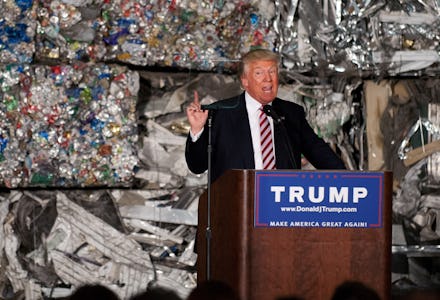The sad truth about Donald Trump and the Paris agreement on climate change

Even if the world were to stick to the terms of the Paris climate agreement, rising global temperatures could still cause potentially irreversible damage.
That's just one of many implications of the latest World Energy Outlook report published on Wednesday by the International Energy Agency, an autonomous body for energy policy comprised of 29 countries.
Over the last century, the average global temperature has risen by 1.4 degrees Fahrenheit.
But most of that change, one degree Fahrenheit, has happened in just the past 30 years alone. Though the numbers seem small, it's been enough to rise sea levels, melt polar ice caps and produce more extreme — and sometimes deadly — weather patterns.
In other words, the rise in temperature is accelerating quickly and dangerously, with looming financial costs and consequences for human health.
That's one reason in September the U.S. formally ratified the Paris treaty, an agreement between 180 countries that was informally signed in December 2015. The agreement aims to prevent a 3.6 degree Fahrenheit increase over pre-industrial average global temperatures by 2100.
Exceeding a 3.6 degree rise would cross a threshold believed to make climate change and its dangerous consequences extreme and irreversible.
Now, the IEA's new report predicts even those countries that try to follow the Paris agreement will fall short of what is needed to prevent global temperatures from crossing that threshold: If everyone does their part, the average rise is still expected to be 4.9 degrees Fahrenheit by 2100, the report finds.
And what if President-elect Donald Trump withdrew the United States from the Paris agreement? The cost — human and financial — of climate change would be even worse.
The IEA report details three possible scenarios. Here are the details:
The best possible scenario involves overhauling energy policy in order to prevent the world exceeding that 3.6 degree number over the next century. In this scenario, the global community would need to invest $40 trillion in renewable and low-carbon energy sources, among other steps.
The second-best outcome, in which we stick to the Paris climate agreement and other COP21 climate pledges — like curbing carbon emissions without inhibiting economic growth — still sees the world temperature increase by 4.9 degrees by 2100. And even this scenario has problems: In order to balance energy supply and demand, oil would need to be $80 per barrel by 2020 (on Wednesday a barrel cost $45.70), with prices increasingly gradually thereafter. This scenario also still includes continued investment in energy-efficient technology.
Notably, in this second-best outcome, global temperatures would still not stay below the 3.6 degree threshold.
The worst possible outcome of the three will occur, the report suggests, if we do not change existing policies at all. This assumes that, not only do current policies cease to change, but President Barack Obama's Clean Power Plan is repealed.
Trump's transition team is already considering undermining Obama's plan, according to documents obtained by the Associated Press.
Doing so would likely result in America's withdrawing from the Paris climate agreement. This, in turn, could disincentivize the world's other biggest carbon emitters — such as China and India — to stick to their promises. And even if those countries followed through on their pledges, the collective emissions target is unlikely to be achievable without the United States.
Certainly, Trump's promise to dismantle the Environmental Protection Agency, along with his appointment of Myron Ebell — a climate change skeptic — to oversee the EPA's transition to the Trump administration, suggest the world better start bracing itself for the worst possible outcome.
Scientific consensus is that human activity is largely responsible for climate change: Burning fossil fuels emits greenhouse gasses like carbon dioxide, which absorb and trap some of the sun's energy in the earth's atmosphere, heating up the planet through the greenhouse effect.
If nothing is done to mitigate climate change, the economic consequences could be devastating. Global gross domestic product could be reduced by 23% while the "average income in the poorest 40% of countries declines 75% by 2100 relative to a world without climate change," according to a Stanford University study.
Trump's team did not respond to a request for comment.